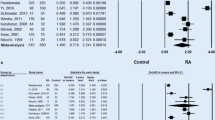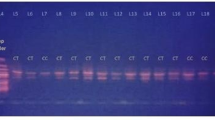Abstract
The 14–3-3 Eta (14–3-3 η) biomarker platform is a relatively recent discovery with the potential to significantly address the diagnosis and prognosis of rheumatoid arthritis (RA) disease. Hypoxia-inducible factor (HIF)-1α and vascular endothelial growth factor (VEGF) have been implicated in inflammatory mechanisms in RA. We hypothesized a molecular association of the coding YWHAH gene and its expressed protein 14–3-3 η with hypoxia and angiogenesis in RA. One hundred healthy subjects and 100 RA patients were enrolled in the study. YWHAH gene expression was determined using quantitative PCR, and its gene polymorphism rs2858750 was assessed by Taqman genotyping assay. Serum levels of 14–3-3 η, HIF-1α, and VEGF were measured using the ELISA technique, and clinical parameters were routinely examined. In RA patients, significant positive correlations were found between 14–3-3 η, HIF-1α (r = 0.84), and VEGF (r = 0.85). YWHAH gene expression was upregulated 10.8 fold (CI 95% 10.1–11.5) in RA patients and significantly correlated with all disease activity parameters, ACPA, and levels of 14–3-3 η, HIF-1α, and VEGF. RA patients showed a higher frequency of YWHAH rs2858750 A allele than healthy subjects (p = 0.02). The risk A allele carriers showed higher disease activity parameters, ACPA, YWHAH gene expression, and increased serum levels of 14–3-3 η (p < 0.001), HIF-1α (p = 0.002), and VEGF (p = 0.001) than the G allele. Serum 14–3-3 η and its rs2858750 genetic variant are associated with increased hypoxia and angiogenesis in RA and activity, and severity of the disease.
Graphical Abstract


Similar content being viewed by others
References
Afuwape AO, Kiriakidis S, Paleolog EM (2002) The role of the angiogenic molecule VEGF in the pathogenesis of rheumatoid arthritis. Histol Histopathol 17(3):961–972
Aletaha D, Neogi T, Silman AJ, Funovits J, Felson DT, Bingham CO 3rd et al (2010) 2010 Rheumatoid arthritis classification criteria: an American College of Rheumatology/European League Against Rheumatism collaborative initiative. Arthritis Rheum 62(9):2569–2581. https://doi.org/10.1002/art.27584
Azizi G, Boghozian R, Mirshafiey A (2014) The potential role of angiogenic factors in rheumatoid arthritis. Int J Rheum Dis 17(4):369–383. https://doi.org/10.1111/1756-185x.12280
Balakrishnan L, Bhattacharjee M, Ahmad S, Nirujogi RS, Renuse S, Subbannayya Y et al (2014) Differential proteomic analysis of synovial fluid from rheumatoid arthritis and osteoarthritis patients. Clin Proteomics 11:1. https://doi.org/10.1186/1559-0275-11-1
Carroll M (2018) Relationship of YWHAH single nucleotide polymorphisms to markers of rheumatoid arthritis disease severity. J Med Biol Stud 1:101
Chao R, Das M, Purat N, Efthimiou P (2018) AB0296|14-3-3eta positivity is associated with higher rheumatoid arthritis disease activity measured by multi-biomarker disease activity assay. Ann Rheum Dis 77:1326–1327. https://doi.org/10.1136/annrheumdis-2018-eular.1836
Chen J, Lee CT, Errico SL, Becker KG, Freed WJ (2007) Increases in expression of 14–3–3 eta and 14–3–3 zeta transcripts during neuroprotection induced by delta9-tetrahydrocannabinol in AF5 cells. J Neurosci Res 85(8):1724–1733
Chimenti MS, Triggianese P, Conigliaro P, Candi E, Melino G, Perricone R (2015) The interplay between inflammation and metabolism in rheumatoid arthritis. Cell Death Dis. https://doi.org/10.1038/cddis.2015.246
Deane KD, El-Gabalawy H (2014) Pathogenesis and prevention of rheumatic disease: focus on preclinical RA and SLE. Nat Rev Rheumatol 10(4):212–228. https://doi.org/10.1038/nrrheum.2014.6
Dolcino M, Ottria A, Barbieri A, Patuzzo G, Tinazzi E, Argentino G et al (2015) Gene expression profiling in peripheral blood cells and synovial membranes of patients with psoriatic arthritis. PLoS ONE 10:e0128262. https://doi.org/10.1371/journal.pone.0128262
Fallin MD, Lasseter VK, Avramopoulos D, Nicodemus KK, Wolyniec PS, McGrath JA et al (2005) Bipolar I disorder and schizophrenia: a 440-single-nucleotide polymorphism screen of 64 candidate genes among Ashkenazi Jewish case-parent trios. Am J Hum Genet 77(6):918–936. https://doi.org/10.1086/497703
Faul F, Erdfelder E, Lang AG, Buchner A (2007) G*Power 3: a flexible statistical power analysis program for the social, behavioral, and biomedical sciences. Behav Res Methods 39(2):175–191. https://doi.org/10.3758/bf03193146
Grover D, Verma R, Goes FS, Mahon PLB, Gershon ES, McMahon FJ et al (2009) Family-based association of YWHAH in psychotic bipolar disorder. Am J Med Genet B Neuropsychiatr Genet. https://doi.org/10.1002/ajmg.b.30927
Guan S-z, Yang Y-q, Bai X, Wang Y, Feng K-q, Zhang H-j et al (2019) Serum 14-3-3η could improve the diagnostic rate of rheumatoid arthritis and correlates to disease activity. Ann Clin Lab Sci 49:57–62
Guo Q, Wang Y, Xu D, Nossent J, Pavlos NJ, Xu J (2018) Rheumatoid arthritis: pathological mechanisms and modern pharmacologic therapies. Bone Res 6:15
Hitchon C, Wong K, Ma G, Reed J, Lyttle D, El-Gabalawy H (2002) Hypoxia-induced production of stromal cell-derived factor 1 (CXCL12) and vascular endothelial growth factor by synovial fibroblasts. Arthritis Rheum 46(10):2587–2597. https://doi.org/10.1002/art.10520
Hodge JA, Kawabata TT, Krishnaswami S, Clark JD, Telliez JB, Dowty ME, Menon S, Lamba M, Zwillich S (2016) The mechanism of action of tofacitinib - an oral Janus kinase inhibitor for the treatment of rheumatoid arthritis. Clin Exp Rheumatol 34(2):318–328
Hu F, Mu R, Zhu J, Shi L, Li Y, Liu X et al (2014) Hypoxia and hypoxia-inducible factor-1α provoke toll-like receptor signalling-induced inflammation in rheumatoid arthritis. Ann Rheum Dis 73(5):928. https://doi.org/10.1136/annrheumdis-2012-202444
Jayarama S, Bt P, Kanum SA (2009) Inhibition of HIF-1α activity by BP-1 ameliorates adjuvant induced arthritis in rats. Biochem Biophys Res Commun 387(2):223–228
Johnson C (2017) Recent advances in the pathogenesis, prediction, and management of rheumatoid arthritis-associated interstitial lung disease. Curr Opin Rheumatol 29(3):254–259
Konisti S, Kiriakidis S, Paleolog EM (2012) Hypoxia–a key regulator of angiogenesis and inflammation in rheumatoid arthritis. Nat Rev Rheumatol 8(3):153–162. https://doi.org/10.1038/nrrheum.2011.205
Li H, Wan A (2013) Apoptosis of rheumatoid arthritis fibroblast-like synoviocytes: possible roles of nitric oxide and the thioredoxin 1. Mediators Inflamm. https://doi.org/10.1155/2013/953462
Lindstrom TM, Robinson WH (2010) A multitude of kinases–which are the best targets in treating rheumatoid arthritis? Rheum Dis Clin North Am 36(2):367–383. https://doi.org/10.1016/j.rdc.2010.02.005
Livak KJ, Schmittgen TD (2001) Analysis of relative gene expression data using real-time quantitative PCR and the 2(-Delta Delta C(T)) Method. Methods 25(4):402–408. https://doi.org/10.1006/meth.2001.1262
Lu N, Malemud CJ (2019) Extracellular signal-regulated kinase: a regulator of cell growth, inflammation, chondrocyte and bone cell receptor-mediated gene expression. Int J Mol Sci 20(15):3792. https://doi.org/10.3390/ijms20153792
Maksymowych WP, Marotta A (2014) 14–3–3eta: a novel biomarker platform for rheumatoid arthritis. Clin Exp Rheumatol 32:35–39
Maksymowych WP, Boire G, van Schaardenburg D, Wichuk S, Turk S, Boers M et al (2015) 14–3-3eta autoantibodies: diagnostic use in early rheumatoid arthritis. J Rheumatol 42(9):1587–1594. https://doi.org/10.3899/jrheum.141385
Muratake T, Hayashi S, Ichikawa T, Kumanishi T, Ichimura Y, Kuwano R et al (1996) Structural organization and chromosomal assignment of the human 14–3-3 eta chain gene (YWHAH). Genomics 36(1):63–69. https://doi.org/10.1006/geno.1996.0426
Novikov A, Aleksandrova E, Cherkasova M, Popkova T, Luchihina E, Novikova D, Karateev D (2017) AB0998 Diagnostic value of 14–3-3 (ETA) in rheumatoid arthritis. Ann Rheum Dis 76:1404–1404. https://doi.org/10.1136/annrheumdis-2017-eular.3997
Qiu Y, Shan W, Yang Y, Jin M, Dai Y, Yang H et al (2019) Reversal of sorafenib resistance in hepatocellular carcinoma: epigenetically regulated disruption of 14–3-3η/hypoxia-inducible factor-1α. Cell Death Discov 5:120. https://doi.org/10.1038/s41420-019-0200-8
Quiñonez-Flores CM, González-Chávez SA, Pacheco-Tena C (2016) Hypoxia and its implications in rheumatoid arthritis. J Biomed Sci 23(1):62
Rhodes B, Merriman ME, Harrison A, Nissen MJ, Smith M, Stamp L et al (2010) A genetic association study of serum acute-phase C-reactive protein levels in rheumatoid arthritis: implications for clinical interpretation. PLoS Med 7(9):e1000341. https://doi.org/10.1371/journal.pmed.1000341
Shen J, Jiang F, Yang Y, Huang G, Pu F, Liu Q et al (2016) 14–3–3η is a novel growth-promoting and angiogenic factor in hepatocellular carcinoma. J Hepatol 65(5):953–962
Sokka T (2003) Work disability in early rheumatoid arthritis. Clin Exp Rheumatol 21:S71–S74
Takahashi Y (2003) The 14–3-3 proteins: gene, gene expression, and function. Neurochem Res 28(8):1265–1273. https://doi.org/10.1023/a:1024296932670
van der Heijde DM, van ’t Hof MA, van Riel PL, Theunisse LA, Lubberts EW, van Leeuwen MA, et al (1990) Judging disease activity in clinical practice in rheumatoid arthritis: first step in the development of a disease activity score. Ann Rheum Dis 49(11):916–920. https://doi.org/10.1136/ard.49.11.916
Wahba AS, Ibrahim ME, Mesbah NM, Saleh SM, Abo-elmatty DM, Mehanna E (2020) Long non-coding RNA MEG3 and its genetic variant rs941576 are associated with rheumatoid arthritis pathogenesis in Egyptian patients. Arch Physiol Bio 1:1–8. https://doi.org/10.1080/13813455.2020.1784951
Wang GL, Jiang BH, Rue EA, Semenza GL (1995) Hypoxia-inducible factor 1 is a basic-helix-loop-helix-PAS heterodimer regulated by cellular O2 tension. Proc Natl Acad Sci U S A 92(12):5510–5514
Wang HS, Duan SW, Xing QH, Du J, Li XW, Xu YF et al (2005) Association study between NPY and YWHAH gene polymorphisms and schizophrenia. Yi Chuan Xue Bao 32(12):1235–1240
Woolf AD, Pfleger B (2003) Burden of major musculoskeletal conditions. Bull World Health Organ 81(9):646–656
Zeng T, Tan L (2018) 14–3-3eta protein: a promising biomarker for rheumatoid arthritis. Biomark Med 12:917–925. https://doi.org/10.2217/bmm-2017-0385
Zhao J, Meyerkord CL, Du Y, Khuri FR, Fu H (2011) 14–3-3 proteins as potential therapeutic targets. Semin Cell Dev Biol 22(7):705–712. https://doi.org/10.1016/j.semcdb.2011.09.012
Zhu J, Su C, Chen Y, Hao X, Jiang J (2019) Electroacupuncture on ST36 and GB39 acupoints inhibits synovial angiogenesis via downregulating HIF-1α/VEGF expression in a rat model of adjuvant arthritis. Evid Based Complement Alternat Med 16:5741931. https://doi.org/10.1155/2019/5741931
Acknowledgements
We gratefully acknowledge the Center of Excellence in Molecular and Cellular Medicine, Faculty of Medicine, Suez Canal University, Ismailia, Egypt for their help to perform the research work.
Funding
The authors did not receive support from any organization for the submitted work.
Author information
Authors and Affiliations
Contributions
All authors contributed in the design of the study. Shaimaa Fattah was responsible for the laboratory work. All authors participated in data collection and analysis, data interpretation and manuscript writing.
Corresponding author
Ethics declarations
Conflict of interest
The authors declare that they have no conflict of interest.
Ethical Approval
All procedures performed in studies involving human participants were in accordance with the ethical standards of the institutional and/or national research committee and with the 1964 Helsinki Declaration and its later amendments or comparable ethical standards. The study was approved by the Faculty of Pharmacy, Suez Canal University Research Ethics Committee (code #201710PHDH2).
Consent to Participate
Informed consent was obtained from all individual participants included in the study.
Consent to Publish
Patients signed informed consent regarding publishing their data.
Additional information
Publisher's Note
Springer Nature remains neutral with regard to jurisdictional claims in published maps and institutional affiliations.
Rights and permissions
About this article
Cite this article
Fattah, S.A., Fattah, M.A.A., Mesbah, N.M. et al. YWHAH Genetic Variants are Associated with Increased Hypoxia Inducible Factor-1α/Vascular Endothelial Growth Factor in Egyptian Rheumatoid Arthritis Patients. Biochem Genet 60, 1986–1999 (2022). https://doi.org/10.1007/s10528-022-10202-x
Received:
Accepted:
Published:
Issue Date:
DOI: https://doi.org/10.1007/s10528-022-10202-x




